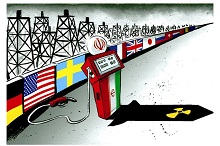 NEW YORK | When Tehran insists that their nuclear essays are peaceful and perfectly fully within UN rules, both the EU and Washington roll their eyes. A long saga with new chapters: Brussels banned all imports of oil from Iran on Monday. The same day, the US announced sanctions on the Iran’s third-largest bank for allegedly helping the Ahmadineyad’s administration to develop its nuclear program.
NEW YORK | When Tehran insists that their nuclear essays are peaceful and perfectly fully within UN rules, both the EU and Washington roll their eyes. A long saga with new chapters: Brussels banned all imports of oil from Iran on Monday. The same day, the US announced sanctions on the Iran’s third-largest bank for allegedly helping the Ahmadineyad’s administration to develop its nuclear program.
Bank Tejarat is the 23rd Iranian-linked financial institution to be blacklisted by Washington since 2006. Any firm that deals with it or its affiliate, Belarus-based Trade Capital Bank, will not be able to access the US financial system. The new laws target both private and government-controlled banks, including central banks, and would come into force after a two to six-month warning period, depending on the transactions.
So what’s next?
“To me, the important question is the extent to which we’ll see non-U.S. banks cut off from the U.S. financial system because of continued processing of transactions involving Iran, particularly Iran’s energy sector, and whether petroleum trading will be pushed into other currencies by Iran,” a former Treasury official told Reuters.
Iran’s currency, the rial, has lost over 70% of its value against the dollar since September. American diplomats have intensified their conversations with big oil producers such as Saudi Arabia, the United Arab Emirates and Kuwait so they increase their production in the coming months. This is crucial to allow countries like Spain (who imports 20 percent of its oil from Iran), Greece and Italy to get supplies. US is also helping emerging oil producers such as Iraq, Libya and Ghana get more production into the market.
At home, the Obama administration has found deep criticism among the most conservative, who find him too soft on the Iran issue:
“The effect of White House ambivalence and incompetence is that Iran, the world’s foremost purveyor of terror, will acquire nuclear weapons in the days ahead. When that happens, reopening the Strait of Hormuz to ensure the world’s supply of energy will become a perilous affair. On January 18, the Obama White House doubled down on this lunacy and pulled the plug on the Keystone pipeline connecting oil fields in western Canada to refineries in Texas. In a blatant pander for votes from environmental radicals, Obama sold out hopes for improving U.S. energy security, guaranteed higher fuel costs for all of us and eliminated tens of thousands of jobs. All this should be a red line for American voters,” FOX News Channel’s host Oliver North writes.
The New York Time‘s Bill Keller points out the enormous tension in Washington due to the election-year:
“It’s hard to imagine the administration would feel free to accept an overture from Tehran (…) Anything short of a humiliating, unilateral Iranian climb-down would be portrayed by the armchair warriors as an Obama surrender. Likewise, if Israel does decide to strike out on its own, Bibi Netanyahu knows that candidate Obama will feel immense pressure to go along.”
Senior fellow at the Claremont Institute Mark Helprin’s op-ed in The Washington Post argues that Iran can be “rational and containable”:
“Any president of the United States fit for the office should someday, soon, say to the American people that in his judgment Iran —because of its longstanding and implacable push for nuclear weapons, its express hostility to the U.S., Israel and the West, and its record of barbarity and terror— must be deprived of the capacity to wound this country and its allies such as they have never been wounded before.”
In a statement issued on Monday, the Iranian Foreign ministry said that the European Union will be responsible for the consequences of its “ill-advised decision” to impose oil embargo against Iran.
“It seems that the European Union has been illogically pursuing the U.S. policies and has been seeking to divert the world’s attention from the popular awakening, which is calling for justice, and anti-discrimination and anti-capitalist movement through creating an unreal atmosphere with the aim of diverting attention from its economic and social problems,” the communiqué said.





Be the first to comment on "US-Iran row gets tenser"